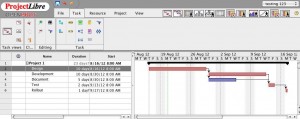 Rich: Today I spoke with Marc O’Brien from the ProjectLibre project, which is a desktop project management tool much like Microsoft Project. I spoke with him today because they have a release coming out over the weekend. It’s the first release of the project in over four years. It used to be known as OpenProj. Due to number of occurrences that we’ll talk a little bit about in the podcast, it has changed its name and it’s coming back out. We’re very excited to have this as a continuing part of the SourceForge family. Here’s my conversation with Marc.
Rich: Today I spoke with Marc O’Brien from the ProjectLibre project, which is a desktop project management tool much like Microsoft Project. I spoke with him today because they have a release coming out over the weekend. It’s the first release of the project in over four years. It used to be known as OpenProj. Due to number of occurrences that we’ll talk a little bit about in the podcast, it has changed its name and it’s coming back out. We’re very excited to have this as a continuing part of the SourceForge family. Here’s my conversation with Marc.
If you’d like to have your project featured on the SourceForge podcast, just drop me a note and we’ll schedule something.
If the embedded audio player below doesn’t work for you, you can download the audio in mp3 or ogg formats.
You can subscribe to this, and future podcasts, in iTunes or elsewhere, at http://feeds.feedburner.com/sourceforge/podcasts, and it’s also listed in the iTunes store.
Rich: First of all, congratulations on the release of your beta.
Marc: Thank you.
Rich: Tell us something about the history of this project. I know that it’s changed its name in the last little bit. Take us back to the beginning and tell us where you’ve been and where you’re going.
Marc: I actually got my start in project management software back in the mainframe days with a company called PSDI, that some people would remember, and then migrated to a DOS-based company that won product of the year by InfoWorld back in the 90s. The founding team has a strong legacy going back to the DOS, Windows days, along with the first team collaboration solution called WebProject. WebProject got acquired, and it kind of terminated the mission which was for Web-based team collaboration and project management software. We launched Progeny, and Progeny had two components, one being the Open Source component, OpenProj, and the other was a cloud component called Project On Demand. That was acquired by Serena Software, and their interest was the cloud computing component, which was Project On Demand. The Open Source component, which is OpenProj, has laid dormant for the last four years. We see it as an important component of the Open Source. So we came back and we rewrote a significant portion of it as ProjectLibre. That’s where ProjectLibre comes from. We are the original founders, and we were the sole developers, of OpenProj as well. And the ProjectLibre product now is release in beta, and we’re really doing a big push with the community. We’ve got a community site out there. It’s been downloaded in the first day in over 65 countries, so I think it’s off to a nice start.
Rich: Where has the project management space gone since we last saw a release of this software?
Marc: That’s a very interesting question, Rich. The project management industry has been dominated by Microsoft. One of the reasons you don’t see many competitors out there is that their market share is so enormous. Maybe we’re foolish to go after them with this Open Source solution. I would say that the biggest move that’s happened in project management software was Oracle acquiring Primavera, which is an excellent company that was very dominant in the Architecture, Engineering and Construction arena – the AEC market – and that, once again, got rolled into Oracle. Microsoft themselves just continues to make this a significant portion of the Office suite. The last estimates we knew, over 6% of all desktop deployments of Office actually contain Project as well. It’s an important component of their revenue stream. It has been four full years since Progeny was acquired, and the commits at SourceForge, and the commits in general, really haven’t occurred in the last four years. Microsoft has come out with Project 2010, and the conversion to Project 2010 was very strong, so the current Open Source tools out there don’t have compatibility. It’s very complex, and so we spent a good deal of the last year writing the import/export round trip capability so that ProjectLibre can simply open existing Project 2010 files and you can actually store them back if you wanted to round-trip it.
Rich: So, what sort of functionality are we talking about?
Marc: It runs the gamut from gantt charts, pert charts, resource, everything from cost controls where you can have actual cost work performed, budgeted cost work performed, you can do all the costing. It’s very very complex software, as far as the behind-the-scenes software goes, and to completely provide round-trip access means we have to have the equivalent functionality. There are even things like different calendars on resources, different calendars on tasks, and projects themselves. Vacation time, cost escalators, if you have overtime costing, or if you want to bill a resource with a different costing structure for different projects. Those are the kind of things outside the “meat and potatoes” of a gantt chart and making tasks. It’s really complex software to replicate in an Open Source project, but that’s what ProjectLibre has.
Rich: You have a release coming out in … what, a couple days now?
Marc: Yes. We put the first beta up there. The community really wanted to see it, so we put that out. We’ve got a release coming out over the weekend, over the long weekend here, it’s going to be a beta 2, and it’ll have installers for Windows and Mac – the .dmg. Actually, the .msi is available right now for Windows. That was uploaded this morning, so there is an installer for that. We’ll have another release next week.
Rich: If somebody wanted to get involved in this project, it sounds like it’s kind of complex and people would have to know quite a bit. Are there places where somebody could start plugging in who didn’t have the entire stack in their mind yet?
Marc: Absolutely. We’ve actually gotten, even pre-release, a lot of contributions. On the translation end, on the documentation end, we even have someone from Africa send us ideas so far as logo changes. So there’s some graphic components there. And we do have a community site, at www.projectlibre.org. People can sign up there and become part of the community. I think documentation, integrations with other software … we’ve had companies contact us who want to integrate in. So I think there’s a number of areas. I think your assessment has some merit as far as the guts of the programming engine itself is very complex. It’s something that, deep knowledge of project management and programming is required, but there’s so much else we can get help on and we really want this to be a community-driven project.
Rich: Is there anything else that your project is trying to accomplish?
Marc: The one other thing is that this is project for the desktop. So this is a replacement of Microsoft Project for the desktop. We’re also in development of a replacement of Microsoft Project Server. That was actually our original mission, was to product a replacement of Microsoft Project Server. Our assumption was that the current Open Source desktop solution would suffice, but when we dug into it, there was just too much that needed updating, and so we really spent the good part of the year updating to release ProjectLibre desktop. But we are going to have a server-side solution as well, and that’s going to be something very new for the marketplace. There’s a lot of complexity to it but our engine is robust enough that the server-side will really be something that the community will embrace I believe.
Rich: Thanks so much for talking with me.
Marc: I really appreciate it, Rich, and I’ll keep you updated on the project.
